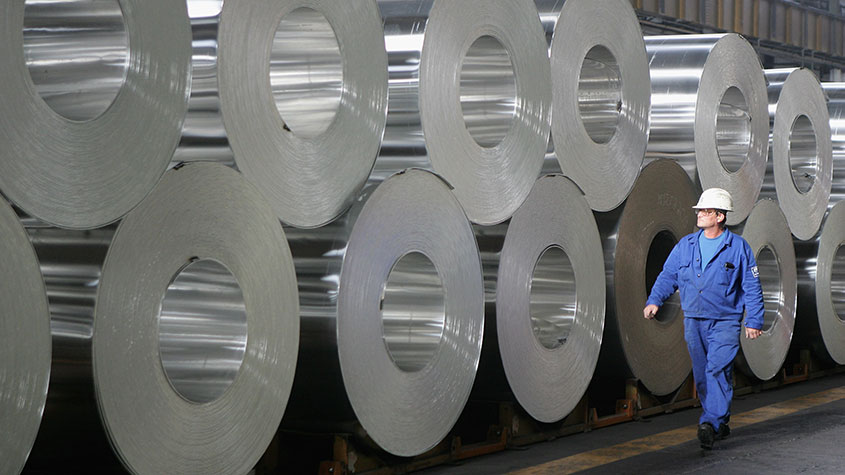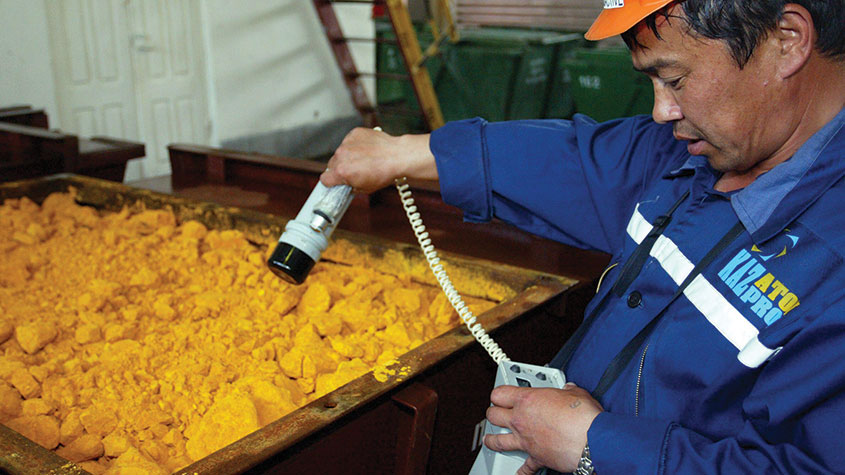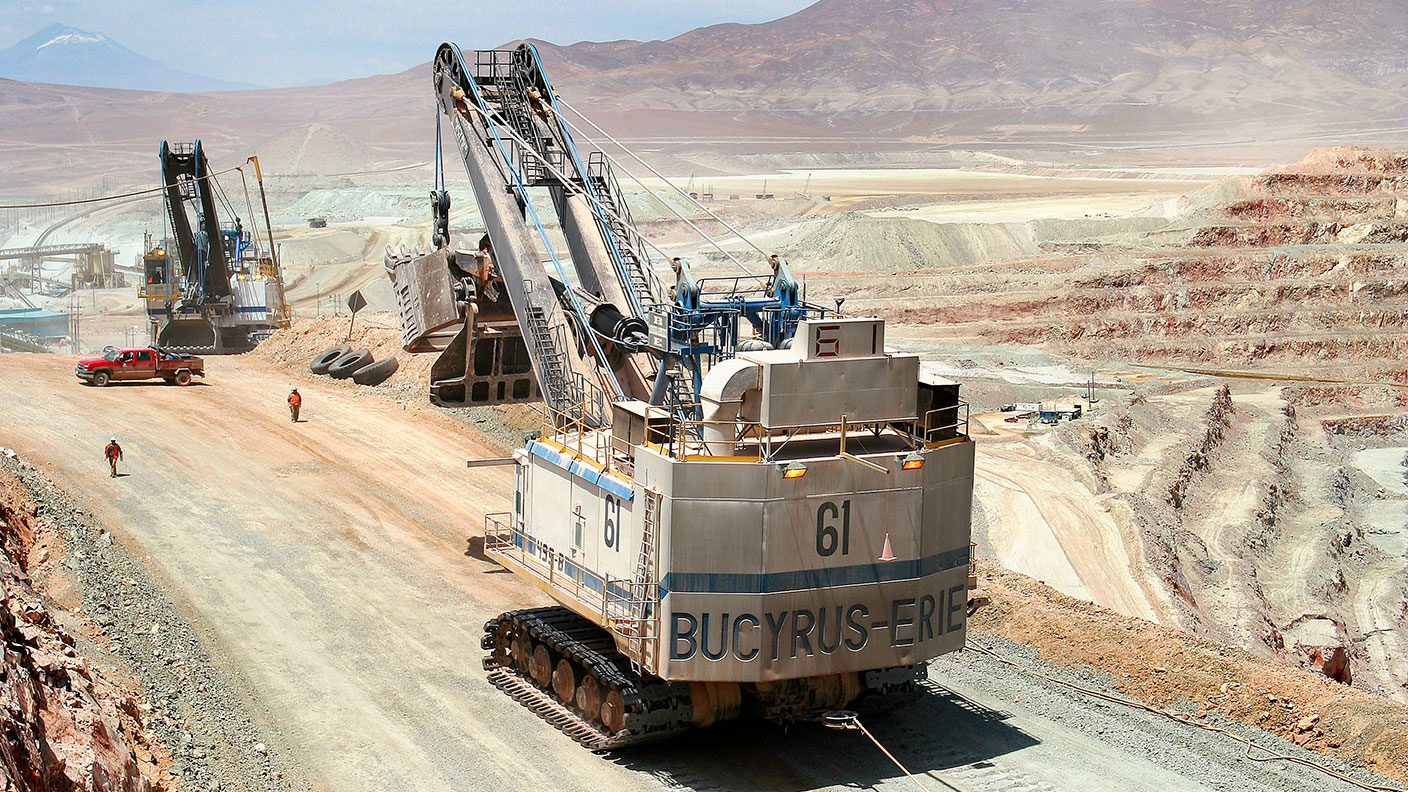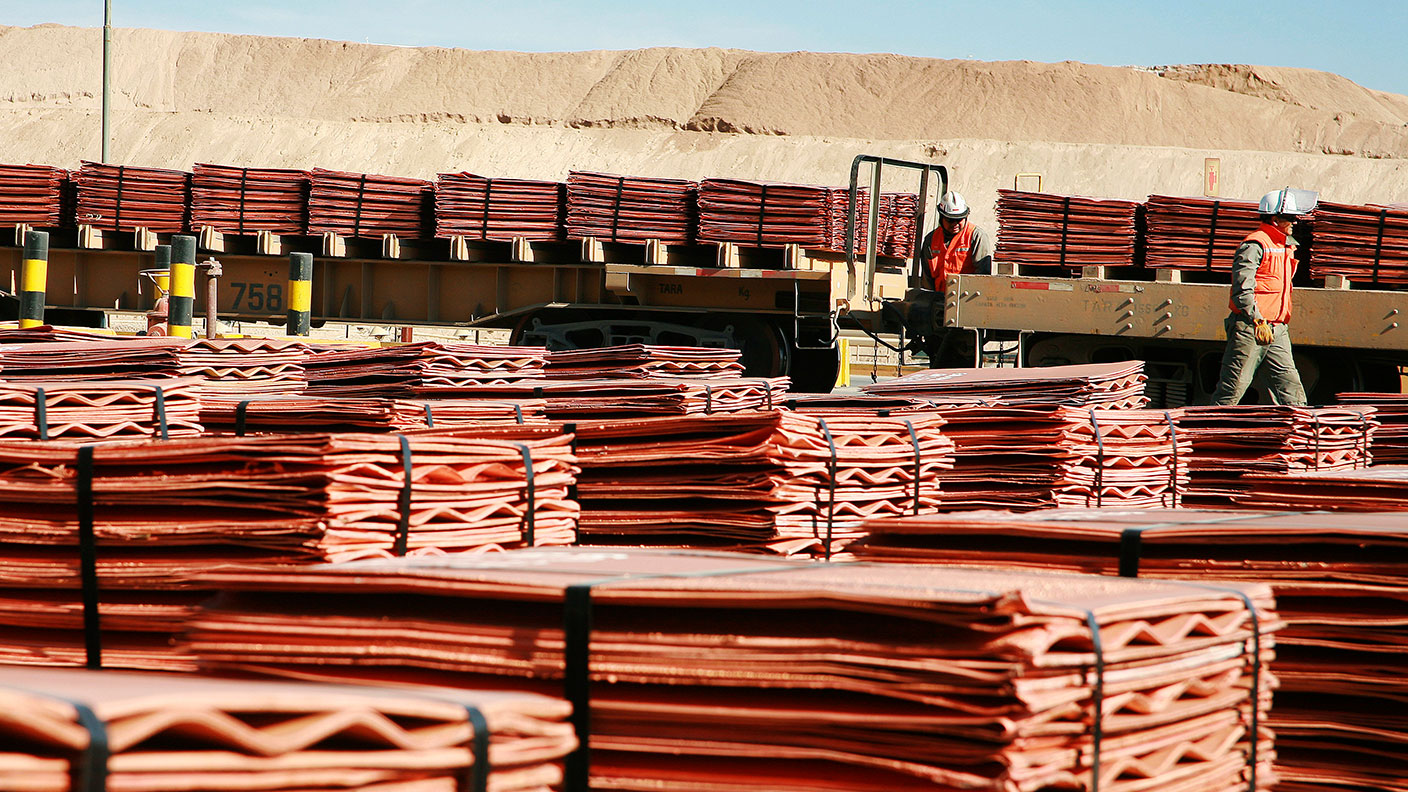Edward Chancellor: why gold miners are a better bet than conventional miners
In the second part of his interview with Merryn Somerset Webb, Edward Chancellor talks about the capital cycle and the prospects for gold stocks.

Get the latest financial news, insights and expert analysis from our award-winning MoneyWeek team, to help you understand what really matters when it comes to your finances.
You are now subscribed
Your newsletter sign-up was successful
Want to add more newsletters?

Twice daily
MoneyWeek
Get the latest financial news, insights and expert analysis from our award-winning MoneyWeek team, to help you understand what really matters when it comes to your finances.

Four times a week
Look After My Bills
Sign up to our free money-saving newsletter, filled with the latest news and expert advice to help you find the best tips and deals for managing your bills. Start saving today!
In the second part of his interview with Merryn Somerset Webb, Edward Chancellor talks about the capital cycle and the prospects for gold stocks.
If you missed the first part of this interview, you can watch it here.
Merryn: What industries, and obviously, I'm thinking about the gold miners we wrote about here, and obviously, I'm thinking about commodities. These industries are at a point in the capital cycle where you think they are worth buying.
MoneyWeek
Subscribe to MoneyWeek today and get your first six magazine issues absolutely FREE

Sign up to Money Morning
Don't miss the latest investment and personal finances news, market analysis, plus money-saving tips with our free twice-daily newsletter
Don't miss the latest investment and personal finances news, market analysis, plus money-saving tips with our free twice-daily newsletter
Ed: Right. So now that would put me on the spot rather more, wouldn't it, than giving you tips as to which stocks
Merryn: What to do ten years ago. Put you on the spot a lot more. But you've written it down in real words, so you can say it on video.
Ed: I have written, for you, a piece that is bullish on gold miners. And the argument there is this. Namely, the gold price, if you remember, went up from around what did we say? $252?
Merryn: Around where we first suggested in MoneyWeek, we just buy.
Ed: And hit a peak of what?
Merryn: $1,800 and something. I can't remember.
Ed: So it had gone up tremendously since 99. The gold mining stocks went on a decent The gold mining stocks were always described, and they still are described, quite wrongly, as an option on the gold price thing. If you want gold and you want a supercharged investment in gold, then you want to buy gold stocks.
And that is just a guaranteed way of losing money. You know that, yes. And any of you who own gold stocks
Merryn: Know that now.
Ed: will know that too. So the question is; why did the gold The gold price is still up, was it roughly three to four times, let's say, from its trough. the trough was really around $300 that it was trading, and it's now, what? $1,050, or thereabouts. So, still, it's up around three times from the trough.
But the gold miners have gone nowhere. And recently, they've lost a great deal of money, and they've under-performed the S&P 500 over the last five years, even though the gold price has still more than doubled. So the question is; why did this happen? And the answer is quite straightforward, is that the gold miners, the guys running the companies, blew the money.
And what they did is they, as the gold price went up, they invested more, and more, and more. And they embarked on some phenomenally bad loss making capital expenditures, of which, Barrick Gold, the world's largest miner, blew, I would say, around $5bn on some South American mining venture up in the Andes, on the Argentine Chilean border.
They blew $5bn without extracting, as far as I know, a single ounce of gold. And they have now closed down the operation and written it off.
Merryn: On the basis that the cost of production would be too high at the current gold price, or at any gold price.
Ed: Well, they were just, they were running into any number of different, operational problems. But the point of this is that, and it's not so dissimilar from the housing, or dotcom, or whatever, you have either, a rising price of something you sell, or even a future demand, drives the capital investment.
And capital investment tends to be overdone, and is, as we know, cash flow negative. It costs money, in plain and simple terms. And then if it's done with too ebullient spirits, it leads to a misallocation capital. And the gold miners have done that in spades. They really are the worst capital allocators out there.
Merryn: I thought you said they weren't uniquely awful.
Ed: They're not, well, I was understating.
Merryn: OK, but uniquely awful.
Ed: They are uniquely awful. I'll tell you why, and you know this as well as I do. If you look at the long-term historic return of miners, of gold miners, relative to the rest of the market, they're around two percentage points annually worse than the rest of the market. Now, that has to be telling you something.
Merryn: Uniquely awful.
Ed: They are uniquely awful, because they've got, as we were saying earlier, too many spivs and crooks running them. But this is not a problem of spivs and crooks. This is a problem of incompetence. Of stupid incompetent people, who get sucked up in the gold mining, gold bull market, and throw a lot of money away.
So my argument is this. That the best thing that ever happened to an investor in gold mining stocks has been the collapse of the gold bubble from $1,800 by 40% or so. And the reason for this very simple intuition is that if the miners could not make money when the gold price was going up, well, they bloody well ought to be able to make money when the gold price is going down.
And the reason they'll make money when the gold price is going down is because they will put a cap on their future expenditure.
Merryn: And they would shut down unprofitable mines.
Ed: They will shut down unprofitable mines. Actually, I'll tell you. So one of the companies I cited in my piece is a company called Newcrest, which is an Australian miner with operations in Indonesia. But what's interesting about this company is it's now being run from someone brought in to run it, who's outside of the gold industry.
He doesn't really care about how many ounces of gold they extract. And he's setting the new metrics that have been set are cash flow generations, return on invested capital, and so on.
Merryn: This is new.
Ed: This is new. These are businesses being run like businesses, rather than being run to pull, some yellow stuff out of the ground for its own purpose. And I think that that and I'll tell you, this is another interesting thing about gold. Although one can say that the amount of gold, and you know this, the amount of gold mined doesn't really make any difference, because it's 2%, the amount mined in any year, it's 2% of the above ground stock.
Having said that, there will be no new gold supply on the market over the next five to ten years. It's pretty clear. I told you, we talked about it earlier, we don't know what the demand for gold will be. It might be high or low, but we do know there will be no supply. You could argue that the supply doesn't really make that much difference.
But in the long-run, it probably does make some difference, and there's going to be no new supply. Now, I think this is where gold differs from, well, in particular, basic materials, mining, such as iron ore mining. Because in that instance, there has been a huge surge of investment, and that investment will carry on coming forward.
And it so happens that the new iron ore mines have a cheaper cost of extraction than the old ones, so there's no incentive
Merryn: To shut those down.
Ed: to shut those down. So we have a combination of new capacity coming on stream, and that being low cost. So that will be there and we don't know, whether demand is going to be high or low, as a China bear, the so called Panda, you know that we're called Pandas now.
Merryn: I didn't know. China's bears are Pandas.
Ed: The Pandas, like you and I, will actually think demand will be fairly weak. But if we put the capital cycle hat on, we'll just say that there has been a lot of massive new supply, and that supply will continue for a while to come.
So everything else being equal, and you can come back and we'll see, in few years' time whether this is right or wrong, I'm going to say that the gold miners, even run by blithering idiots, have, at this moment, a better prospect than the conventional miners. Which, by and large, are run by much more professional people.
Merryn: All right. So we're going to buy gold miners. We're not quite going to buy the other miners yet, other big miners. We're probably not going to buy oil yet. Oh, look, a downfall.
Ed: oil is to tell you the truth, I haven't quite done enough work on oil.
Merryn: Take a guess.
Ed: No. So the bull, you like a bull story?
Merryn: Yes.
Ed: So the bull story is this, and it's a capital cycle story. There has been a surge of investment in energy. We all know that. A lot of it didn't come to anything. Like, the big oil majors spent a lot of time drilling holes in deep water in the Arctic, and they hardly managed to, despite all this expenditure, hardly managed to replenish their reserves, let alone build up any new reserves.
However, in the States, where money was dirt cheap, and someone had discovered fracking, of getting oil through the fracking process. There was a huge investment in fracking in, if you will wildcat rigs across the States. And that has expanded supply, as far as I understand, by I don't know, two or three million barrels of oil a day.
Now, again, from the capital cycle perspective, those frackers are toast. And they are going out of business now.
Merryn: Are they? Even though their cost of production is getting lower and lower?
Ed: Well, you have to get Jim Chanos in. He was presenting on this subject the other day at the presentation I went to, and the argument there is that a lot of this new supply in the States is only profitable at $60 to $70 a barrel. And the analysts have $80 in their models, so they're pricing it off at a much higher oil price.
So let's assume that in the first instance, the price of oil stays about roughly where it is. And these wildcat frackers, who've increased supply, disappear over the next two or three years. And let's also assume, this is not quite certain, that those oil wells that they've uncovered was just a short increase, a temporary increase in supply.
some people compare I know nothing about the oil industry, but I like the idea that you compare an oil well to a can of Coke that's been shaken up, and you open the lid and it gushes out. Now, what I understand is that the frackers, it gushes out much faster than a conventional well. And it could be, and no one's 100% certain about this, so they could have much shorter lives.
Merryn: I understood that there were these vast fields that, would last for many, many, many, many years. And also, more importantly, that they could be turned on and off really quickly. So they're swing producers, that will hold the price of oil at $50, $60, indefinitely. I guess that's the bear case.
Ed: but Merryn, that may be the bear case, but you have to bear in mind that that's the sort of bear case that's put out after the oil price has already fallen 50%. When it was up, Goldmans, for instance, now, is saying the oil price at $50
Merryn: And we all remember their $150 call, don't we?
Ed: It was $300.
Merryn: Was it $300?
Ed: You have to go back to, I think, 2008, they were calling $300. Now, the point of this, as is that market, as Jim Grant says, markets make opinions, not the other way around. So a low oil price will engender thoughts that there will be a huge amount of supply at the margin.
Some intelligent people think believe that that may not be the case. In which case, if you take out the frackers, you could take out a couple of million barrels of supply, and you might find that the supply conditions for the oil industry, forget about demand, could rectify much more quickly than, say, for iron ore and conventional mining. So if we're going to put a category, do you want a category?
Merryn: Yes, I do.
Ed: We're going to start from a capital cycle perspective and say; the gold miners look ripe about now, regardless of what happens to the oil price. But as I say, the lower the better, because it gets rid of the marginal producers. The energy guys are worth keeping an eye on. Do you want someone gave me quite a nice idea, if you want an idea.
Merryn: Absolutely. We always want ideas, particularly when they're second hand.
Ed: [Laughs] where does one get an idea from, if it's not second hand? So one of my former colleagues, I was talking to him about this subject. And it's his thesis that, that the fracking supply could come off fairly rapidly. And I asked him and said what was he interested in?
He's not interested in the big energy, the big oil. Because, well, they've had a pretty wretched time of it recently, and they're having trouble just, as I say, replenishing their reserves. However, if you want to be politically incorrect
Merryn: Always.
Ed: Canadian tar sands businesses have, apparently, and you can check up on this, they've, apparently, they have invested a lot in their start-up investment, but their marginal cost of production is lower than the frackers. So it's conceivable that if you wanted to leverage play on a long supply of oil, in other words, a stream of oil coming out for the next 30 years or so, that you should look towards the tar sands business.
Now, the environmentalists will not be pleased if you buy your stocks. However, I'm told, so, for instance, there's one called Canadian Natural Resources, apparently good stock, a good company run by reasonably sensible people.
Merryn: Wouldn't this also, maybe, then be a wonderful time to buy Russian oil companies? They're double cheap. Is that too much for you? That's just too much.
Ed: [Laughs] I own, sort of Look, the test, another test of whether you've made a good investment, is you buy an investment and see it halve in price, and do you want to own more or do you have second thoughts? The point is, if you own something in Russia, and it halves in price, it is technically cheaper.
But then you realise that it's country run by, a very unpleasant man, who not only, is prepared to invade his neighbours, but has absolutely no concern whatsoever for the interests of domestic, let alone foreign investors. Foreign investors on Putin's list of priorities is extremely low.
And if you, if you don't know that, you can read that rather good book by Bill Browder, I think it's called Red Alert that came out earlier this year, explaining what happens if you invest in Russia. So the trouble with Russia is that yes, stuff is cheap, and particularly, the Gazproms of this world. But their cash flows are diverted by Putin to his cronies, and perform national service. it may be that they're so cheap, you can't
Merryn: That doesn't matter.
Ed: No. look, this year, the Russian stock market is one of the best performers.
Merryn: Exactly. This is my point. It depends how much you care about this stuff, if we're being politically incorrect.
Ed: Well, I don't know. My own preference is to separate one's social concerns from one's investments. Because, if it's legal, I think you should, in the investment world, do it, really, so to speak. And if it shouldn't be legal, I think that someone should frame a law against it. I think that was quite right.
Now, with Russia, I suppose my feeling about this is not just with Russia, but really, with a lot of the emerging markets. Because there is no, if you want to call it, corporate governance, and because the state, there's no rule of law, what is your claim on property?
So you can get, I think, Russia is really a binary proposition, you know. You're either going to make money
Merryn: Or you're not going to have any left at all.
Ed: So my own view is just, not and I did it myself, but I didn't double down, is have some small exposure, because it's very cheap, but don't, but be prepared to lose it all.
Merryn: Yes. We have that as well, some small exposure to Russia. Anyway, I think we better leave it there, so thank you very much. So now we know buy gold, buy politically correct oil, don't
Ed: Incorrect oil.
Merryn: Well, it's both. It's politically correct because it's in Canada, and politically incorrect because it's tar sands, right?
Ed: Yes.
Merryn: It's both. Maybe that evens out. So buy neutrally correct oil, neutrally politically correct oil. Either way. Gold miners
Ed: And buy Capital Returns.
Merryn: Oh, and buy Capital Returns, the book, because that's going to be a fabulous investment. It should be in everybody's Christmas stocking, right?
Ed: I wouldn't put it in a Christmas stocking, personally, but you could buy it for reading in the New Year.
Merryn: Perfect. Thank you.
Ed: Thanks, Merryn.
Get the latest financial news, insights and expert analysis from our award-winning MoneyWeek team, to help you understand what really matters when it comes to your finances.

-
 Early signs of the AI apocalypse?
Early signs of the AI apocalypse?Uncertainty is rife as investors question what the impact of AI will be.
-
 Reach for the stars to boost Britain's space industry
Reach for the stars to boost Britain's space industryopinion We can’t afford to neglect Britain's space industry. Unfortunately, the government is taking completely the wrong approach, says Matthew Lynn
-
 These 2 stocks are set to soar
These 2 stocks are set to soarTips The returns from these two aluminium and tin stocks could be spectacular when the commodity cycle turns says David J Stevenson.
-
 The best ways to buy strategic metals
The best ways to buy strategic metalsTips Weaker prices for strategic metals in the alternative-energy sector are an investment opportunity, says David Stevenson. Here, he picks some of the best ways to buy in.
-
 House prices to crash? Your house may still be making you money, but not for much longer
House prices to crash? Your house may still be making you money, but not for much longerOpinion If you’re relying on your property to fund your pension, you may have to think again. But, says Merryn Somerset Webb, if house prices start to fall there may be a silver lining.
-
 A lesson for investors from a ill-fated silver mine
A lesson for investors from a ill-fated silver mineAnalysis Mining methods may have changed since the industry’s early days, but the business hasn’t – digging ore from the ground and selling it at a profit. The trouble is, says Dominic Frisby, the scams haven't changed either.
-
 Prepare your portfolio for recession
Prepare your portfolio for recessionOpinion A recession is looking increasingly likely. Add in a bear market and soaring inflation, and things are going to get very complicated for investors, says Merryn Somerset Webb.
-
 The natural resources industry is in a tight spot – which is bad news for the rest of us
The natural resources industry is in a tight spot – which is bad news for the rest of usOpinion The natural resources industry is in a bind. We need it to produce more energy and metals, but it has been starved of investment, plagued by supply chain issues, and hobbled by red tape. That’s bad news for everyone, says Dominic Frisby.
-
 Investing for income? Here are six investment trusts to buy now
Investing for income? Here are six investment trusts to buy nowOpinion For many savers and investors, income is getting hard to find. But it's not impossible to find, says Merryn Somerset Webb. Here, she picks six investment trusts that are currently yielding more than 4%.
-
 How to invest in the copper boom
How to invest in the copper boomTips The price of copper has slipped recently. But that’s temporary – the long-term outlook is very bullish, says Dominic Frisby. Here, he explains the best ways to invest in copper.